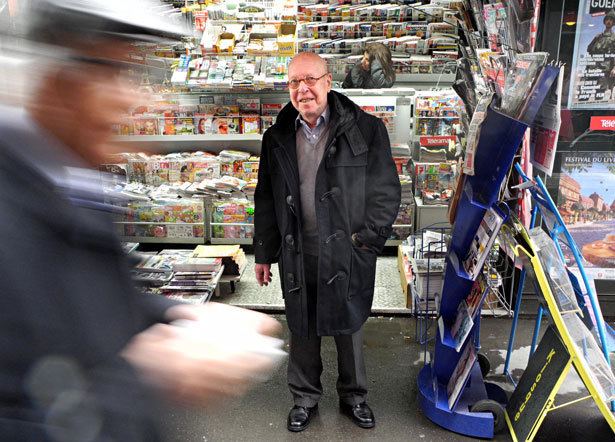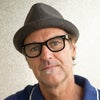The Tour de France lost one of its greatest writers this week and one of its greatest servants. And I lost a mentor and a friend.
It is said that, with certain people, you only have to meet them once to remember them forever. And Sam Abt was one such a character, especially in the press room of the Tour de France.
Sam was nothing short of a pioneering figure in cycling journalism. First covering the Tour in the late 1970s, he did no less than 31 Tours altogether for the International Herald Tribune and The New York Times. One of the very first anglophones on the Tour, he enlightened and inspired generations of American bike racers and aspiring journalists. I know. I was both.
Simply put, his writing was exceptional. It was at once efficient, witty, insightful and at times downright transcendent. His fans went well beyond the press room, as at least one head of state would call him during the Tour to get his take on the race.
All of this from a chain-smoking reporter who never really rode a bike. But he knew the sport like few others did. He had that rare touch for putting every quote in perfect context and sports directors knew that they could not soft pedal a bad result when speaking with Sam.
In addition to his newspaper work, Sam wrote numerous books about the Tour and the sport.
“Breakaway: On the road with the Tour de France,” “In High Gear: The World of Professional Bicycle Racing,” “Pedaling for Glory: Victory and Drama in Professional Bicycle Racing” and “LeMond, The Incredible Comeback of an American Hero” are just a few that inspired a generation of journalists and still do today.
It is safe to say that Sam cut a striking image and according to Philippe Brunel, the longtime cycling journalist for the French sports daily l’Equipe, there was a bit of Woody Allen in Sam, who always wore khaki trousers and an Oxford shirt fit for any East Coast intellectual. Oh, and for the hottest of days, he had a pair of khaki shorts in reserve.
Unlike most of us in the press room, cycling journalism was not Sam’s day job. Instead, it was his summer vacation, as he was a seasoned reporter and editor. Early in his career, while at The New York Times, he actually worked on the Pentagon Papers, and when I met him, he was one of the top editors at the International Herald Tribune. Day in and day out, he would read tens of thousands of words, discussing with his staff which stories merited front-page coverage.
The Tour was on his own time. But that is what made him unique. He was so well read that he could constantly make comparisons or analogies between cycling and current affairs, history, or literature.
In one of the many unforgettable moments, I remember him reading a newspaper over breakfast during the 1998 Tour. We were in the throngs of the worst doping scandals the sport had ever known and suddenly he blurted out, “Hah! Monica Lewinsky. Probably the only person that has not been cited in the Festina Affair!”
But the fact that the Tour de France was on his vacation time also demonstrated just how important this race was to him. It was his secret garden, his chance to get away from the daily news and the daily grind. In fact, as I remember, he even refused an offer to return to the New York Times at one point because, well, it was not clear if he could cover the Tour.
Sam loved the Tour.
I covered my first Tour in 1990 and met him shortly after, my eyes wide open in admiration. Sam was always friendly and encouraging of my early efforts in journalism, frequently offering kind words about a story I had written. And I was not alone.
“For me he was very welcoming and supportive,” Jeremy Whittle, a long-time friend in the press room, told me on Friday while reflecting on Sam’s passing. Whittle, a regular contributor to Velo, is now one of the veterans, but he too remembers Sam’s generosity in his early years.
“He was very kind about giving time. Other people weren’t like that with a young journalist coming in,” Whittle said. “He was always down to earth and always had a joke. He could be very irreverent about cycling, He was respectful, but also really insightful and always questioning as well. I have very good memories of him. He could really make me laugh out loud.”
On the road with Sam

When I moved to Paris in 1992, we started to see more of each other, first during his lunch break or on a weekend. And then we started going to races together, first the classics like Het Volk or Liège-Bastogne-Liège, and finally, the Tour.
He often jumped in my car during the 1996 Tour and then in 1997 we decided to travel together for the entire Tour, a trend that continued until his final Tour in 2007.
I did the driving and Sam was the navigator. In the years before the GPS, there was often a bit of guess work in finding our destination. “Left at the old geezer!” he once shouted out, as we struggled to find our hotel in Saint-Étienne. On this occasion, his instructions got us there.
I sometimes joke that we ended up traveling together because I would tolerate his smoking. It is something I normally loathe, but in Sam’s case, it was a small price to pay. Very quickly, I understood that I was in the front-row seat of cycling journalism. Back in the day, we still drove the entire race route every day, often driving behind the breakaway, something that rarely happens in modern journalism.
Kilometer after kilometer he would jot down things that he saw, a funny sign, a picturesque village, and on more than one occasion he pulled up a vegetable root to learn what was growing along the roadside of the Tour. He was endlessly curious and observant, and as a result, he could always pepper a story with some local factoid that was somehow related to the race at hand.
Arriving in the press room, he was truly in his domain. Rarely did he take more than an hour to turn in his copy, and if the editors asked for 900 words, the word count would not be 901. A journalist’s rigor he had in spades.
And then there were the dinners, which always started with a glass or pitcher of rosé. Twenty or 30 years ago rosé was not held in high esteem here in France, and I often goaded him regarding his drink choice. Brushing me aside, he often responded by saying, “Bring on the swill!”
We would often sit down late to eat. And conversation went even later into the night, as we recounted the stage and what we saw during the day. In many ways, what actually went into the paper the following day was simply a glimpse of our discussions. Sam had the uncanny ability to shift between irony and insight. At one moment he could be flippant, another deadly serious.
Bike talk never got better than with Sam, and I had a front row seat.
In the years after he retired from the Tour, he still wrote on occasion, and we still saw each other in Paris frequently for lunches, dinners or holidays. Often we got together with his son John, who was as devoted as any son could be and Sam was eternally grateful.
It was John that called me on Friday, hours after he passed. It was a call that I knew would come one day as he was over 90 and his health was fading. But such calls never come easily and the sense of loss was immediate.
It was perhaps only fitting that Sam passed during the Tour de France, and I have been truly touched by the outpouring of messages.
Among others, Greg LeMond sent me a text message about Sam’s passing.
“I just saw this morning that Sam passed. Very sad,” LeMond said. “As an American racing in Europe, Sam was the gateway to the larger non-cycling fan public in the USA, exposing the Tour to a much larger audience.”
Everybody here in the press room that knew Sam was truly moved by the news and everyone had fond memories to share.
After all, you only needed to meet Sam once to remember him forever.
These days, I travel frequently with Velo’s Andrew Hood, another longtime friend of Sam and me. At dinner last night we promptly ordered some rosé. It was some proper swill if I say so myself. But that didn’t matter.
We toasted to Sam, as we will do tonight and every night on the Tour.
Cheers, Sam!
